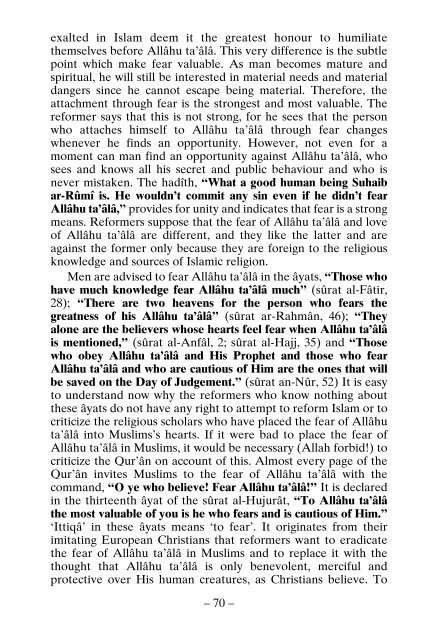Islams Reformers
The bigotry of the religion reformers or bigots of science who surfaced lately to blame all previous scholars, basic fundamental beliefs or practices
The bigotry of the religion reformers or bigots of science who surfaced lately to blame all previous scholars, basic fundamental beliefs or practices
Create successful ePaper yourself
Turn your PDF publications into a flip-book with our unique Google optimized e-Paper software.
exalted in Islam deem it the greatest honour to humiliate<br />
themselves before Allâhu ta’âlâ. This very difference is the subtle<br />
point which make fear valuable. As man becomes mature and<br />
spiritual, he will still be interested in material needs and material<br />
dangers since he cannot escape being material. Therefore, the<br />
attachment through fear is the strongest and most valuable. The<br />
reformer says that this is not strong, for he sees that the person<br />
who attaches himself to Allâhu ta’âlâ through fear changes<br />
whenever he finds an opportunity. However, not even for a<br />
moment can man find an opportunity against Allâhu ta’âlâ, who<br />
sees and knows all his secret and public behaviour and who is<br />
never mistaken. The hadîth, “What a good human being Suhaib<br />
ar-Rûmî is. He wouldn’t commit any sin even if he didn’t fear<br />
Allâhu ta’âlâ,” provides for unity and indicates that fear is a strong<br />
means. <strong>Reformers</strong> suppose that the fear of Allâhu ta’âlâ and love<br />
of Allâhu ta’âlâ are different, and they like the latter and are<br />
against the former only because they are foreign to the religious<br />
knowledge and sources of Islamic religion.<br />
Men are advised to fear Allâhu ta’âlâ in the âyats, “Those who<br />
have much knowledge fear Allâhu ta’âlâ much” (sûrat al-Fâtir,<br />
28); “There are two heavens for the person who fears the<br />
greatness of his Allâhu ta’âlâ” (sûrat ar-Rahmân, 46); “They<br />
alone are the believers whose hearts feel fear when Allâhu ta’âlâ<br />
is mentioned,” (sûrat al-Anfâl, 2; sûrat al-Hajj, 35) and “Those<br />
who obey Allâhu ta’âlâ and His Prophet and those who fear<br />
Allâhu ta’âlâ and who are cautious of Him are the ones that will<br />
be saved on the Day of Judgement.” (sûrat an-Nûr, 52) It is easy<br />
to understand now why the reformers who know nothing about<br />
these âyats do not have any right to attempt to reform Islam or to<br />
criticize the religious scholars who have placed the fear of Allâhu<br />
ta’âlâ into Muslims’s hearts. If it were bad to place the fear of<br />
Allâhu ta’âlâ in Muslims, it would be necessary (Allah forbid!) to<br />
criticize the Qur’ân on account of this. Almost every page of the<br />
Qur’ân invites Muslims to the fear of Allâhu ta’âlâ with the<br />
command, “O ye who believe! Fear Allâhu ta’âlâ!” It is declared<br />
in the thirteenth âyat of the sûrat al-Hujurât, “To Allâhu ta’âlâ<br />
the most valuable of you is he who fears and is cautious of Him.”<br />
‘Ittiqâ’ in these âyats means ‘to fear’. It originates from their<br />
imitating European Christians that reformers want to eradicate<br />
the fear of Allâhu ta’âlâ in Muslims and to replace it with the<br />
thought that Allâhu ta’âlâ is only benevolent, merciful and<br />
protective over His human creatures, as Christians believe. To<br />
– 70 –

















